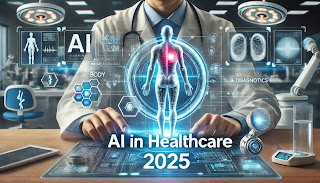How AI is Revolutionizing Healthcare in 2025
Explore the impact of AI in medicine, from early diagnosis to robotic surgeries and personalized treatments.
Introduction
AI is making healthcare smarter and more efficient. In 2025, AI-powered tools are enhancing patient care, speeding up diagnostics, and enabling life-saving treatments. Let’s dive into how AI is reshaping the medical industry.
How AI is Changing Healthcare
1. AI in Early Diagnosis
AI algorithms can detect diseases like cancer, heart conditions, and neurological disorders with greater accuracy and speed than traditional methods.
2. AI-Powered Robotic Surgeries
Robotic-assisted surgeries are now more precise, reducing recovery times and improving patient outcomes.
3. Personalized Medicine
AI analyzes a patient’s genetic data to recommend personalized treatments, leading to more effective care.
4. AI in Drug Discovery
AI accelerates the development of new drugs by predicting molecular interactions and testing compounds virtually.
5. AI-Powered Virtual Doctors
AI chatbots and virtual assistants provide initial medical consultations, reducing hospital visits and easing the burden on healthcare workers.
6. AI in Medical Imaging
AI enhances MRI, CT scans, and X-ray analysis, improving diagnostic accuracy and reducing human error.
7. AI for Predicting Disease Outbreaks
AI analyzes global health data to predict and prevent pandemics before they spread.
8. AI-Powered Wearable Health Tech
Smartwatches and wearable devices track vital signs and alert users to potential health risks in real time.
9. AI in Mental Health Support
AI-driven mental health apps provide therapy and emotional support to patients worldwide.
10. AI in Hospital Management
AI optimizes hospital operations, streamlining patient admissions, medical records, and staff allocation.
Conclusion
AI is revolutionizing healthcare in 2025, making treatments faster, more accurate, and more accessible. As technology advances, the future of medicine will continue to evolve, saving lives and improving patient care.

Comments
Post a Comment